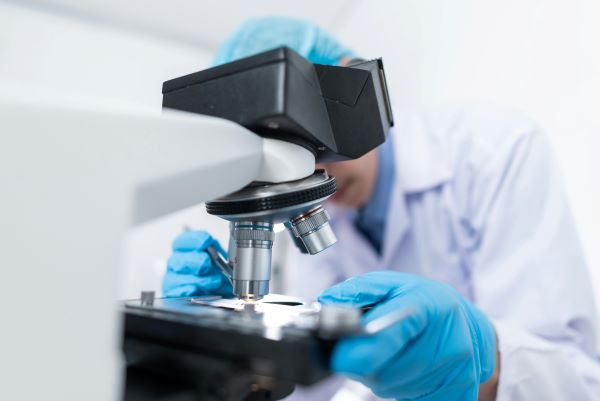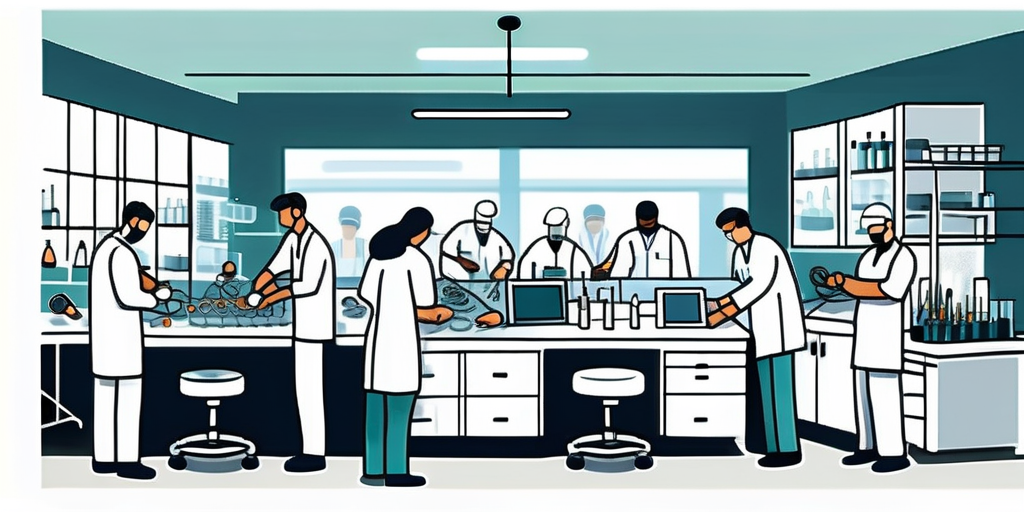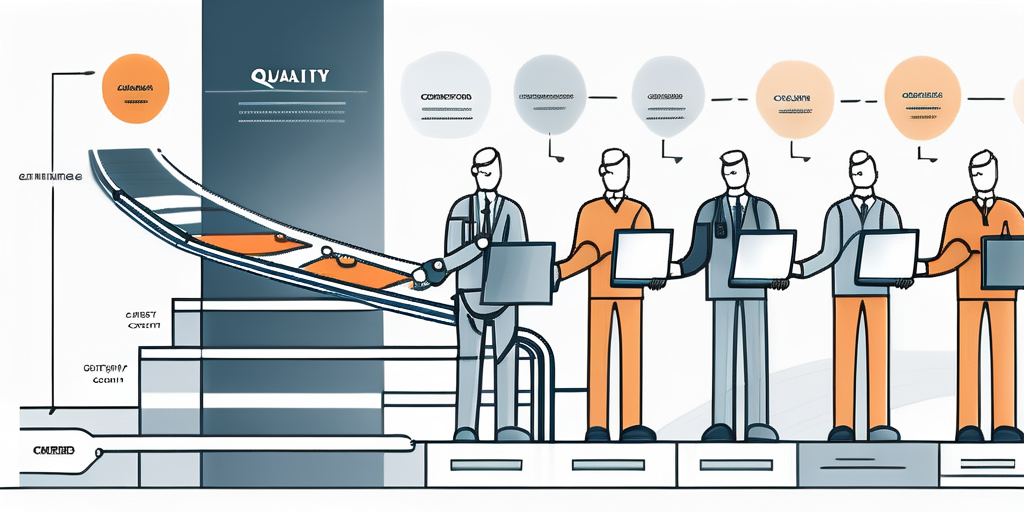
Quick CV Dropoff
Send us your CV

Are you interested in pursuing a career in quality control within the pharmaceutical industry? If so, you're in luck! Quality control plays a crucial role in ensuring that pharmaceutical products meet the highest standards of safety and efficacy. In this article, we will take a closer look at the top jobs in quality control in the pharmaceutical industry, the essential skills needed for success in these roles, and the career path and progression opportunities available.
Quality control is an integral part of the pharmaceutical industry. Its primary focus is to ensure that drugs and medical devices are manufactured, tested, and distributed in compliance with regulatory guidelines and industry standards. By implementing quality control processes, pharmaceutical companies can identify and resolve any issues or deficiencies that could impact product quality and patient safety.
Quality control is of utmost importance in the pharmaceutical industry due to the critical nature of the products being manufactured. The lives and well-being of patients depend on the safety and effectiveness of pharmaceutical products. Quality control ensures that these products are consistently reliable, free from contamination, and manufactured according to approved protocols.
Quality control encompasses various key processes in the pharmaceutical industry. This includes raw material testing, in-process testing, finished product testing, stability testing, and environmental monitoring. These processes involve the use of advanced analytical techniques and instruments to assess the quality and performance of pharmaceutical products.
Raw material testing is a crucial step in quality control. It involves the analysis of the ingredients used in the manufacturing of pharmaceutical products. This testing ensures that the raw materials meet the required specifications and are free from impurities or contaminants that could compromise the quality of the final product. By conducting rigorous testing, pharmaceutical companies can ensure that only high-quality raw materials are used in their manufacturing processes.
In-process testing is another important aspect of quality control. It involves monitoring and analyzing the product at various stages of the manufacturing process. This allows pharmaceutical companies to identify any deviations or abnormalities early on and take corrective actions to maintain product quality. In-process testing helps ensure that the final product meets the required specifications and is safe for consumption or use.
Stability testing is conducted to assess the shelf life and storage conditions of pharmaceutical products. This testing involves subjecting the products to various environmental conditions, such as temperature and humidity, to evaluate their stability over time. By conducting stability testing, pharmaceutical companies can determine the expiration date of their products and provide accurate storage instructions to ensure their effectiveness and safety.
Environmental monitoring is an essential part of quality control in the pharmaceutical industry. It involves regular monitoring of the manufacturing environment to ensure that it meets the required cleanliness and safety standards. This includes monitoring air quality, surface cleanliness, and microbial contamination. By maintaining a controlled and clean environment, pharmaceutical companies can minimize the risk of product contamination and ensure the production of high-quality pharmaceutical products.
To excel in quality control jobs within the pharmaceutical industry, certain skills are paramount. These skills can be broadly categorized into technical skills and soft skills.

Technical skills are crucial in quality control positions. Proficiency in laboratory techniques, such as chromatography, spectrophotometry, and microbiological testing, is essential. Familiarity with regulatory guidelines, such as Good Manufacturing Practices (GMP) and Good Laboratory Practices (GLP), is also necessary to ensure compliance and uphold product quality.
Soft skills are equally important in quality control jobs. Effective communication skills, attention to detail, critical thinking, and problem-solving abilities are essential for success. Quality control professionals often collaborate with cross-functional teams, interact with regulatory authorities during audits and inspections, and provide training and guidance to staff, making strong interpersonal skills crucial.
Now, let's dive into some of the top quality control jobs you can pursue within the pharmaceutical industry.
A Quality Control Analyst plays a vital role in testing and analyzing raw materials, in-process samples, and finished products to ensure compliance with specifications. They utilize sophisticated instruments and techniques to perform tests, interpret data, and provide accurate and timely reports. Attention to detail and a strong understanding of regulatory requirements are essential for this role.
A Quality Control Manager oversees the overall quality control operations within a pharmaceutical company. They are responsible for setting quality objectives, developing and implementing quality control procedures, managing a team of analysts, and ensuring regulatory compliance. Strong leadership skills and a deep understanding of quality systems and regulations are crucial for success in this role.
A Quality Assurance Specialist plays a pivotal role in ensuring compliance and adherence to quality standards throughout the manufacturing process. They review and approve standard operating procedures, conduct audits and inspections, and provide training and guidance to staff members. Attention to detail and a thorough understanding of regulatory requirements are vital for this role.
Let's take a closer look at the specific duties and responsibilities of each of these quality control roles.
A Quality Control Analyst conducts various tests on raw materials, in-process samples, and finished products. They perform analytical testing using techniques such as high-performance liquid chromatography (HPLC), gas chromatography (GC), and dissolution testing. They analyze and interpret test results, troubleshoot any technical issues that arise, and prepare detailed reports documenting their findings.
A Quality Control Manager oversees and coordinates quality control activities within a pharmaceutical company. They develop and implement quality control procedures, monitor process performance, and ensure compliance with regulatory requirements. They manage a team of quality control analysts, providing guidance, training, and support. Additionally, they conduct internal and external audits, prepare reports, and communicate with regulatory authorities to maintain compliance.
A Quality Assurance Specialist is responsible for ensuring that all processes and procedures meet the required quality standards. They review and approve standard operating procedures (SOPs) to ensure compliance with regulations. They conduct audits and inspections to identify non-compliance issues and implement corrective actions. They also provide training to staff members, ensuring that quality control practices are followed consistently throughout the organization.
If you're considering a career in quality control, it's essential to understand the potential career path and progression opportunities within the pharmaceutical industry.

Starting as a Quality Control Analyst is a common entry point for individuals with a scientific background. As a Quality Control Analyst, you will gain hands-on experience in performing tests and analyzing data. With time and experience, you can progress to more senior positions.
Mid-level positions in quality control include roles such as Senior Quality Control Analyst or Quality Control Supervisor. In these roles, you will assume greater responsibility, oversee analytical testing operations, and provide guidance and support to junior analysts.
Senior-level positions in quality control include roles such as Quality Control Manager or Quality Assurance Manager. In these roles, you will have overall responsibility for quality control operations, including managing teams, developing and implementing quality control strategies, and ensuring compliance with regulations.
With dedication, continuous learning, and a proactive approach, you can carve out a successful career in quality control in the pharmaceutical industry. The demand for qualified quality control professionals is growing, making this an exciting and rewarding field to explore.
In conclusion, the top jobs in quality control in the pharmaceutical industry offer fulfilling and challenging career opportunities. Acquire the essential skills, understand your role responsibilities, and set your sights on career progression. Let's work together to make your mark in the dynamic field of pharmaceutical quality control. Reach out today and seize your chance for professional success!